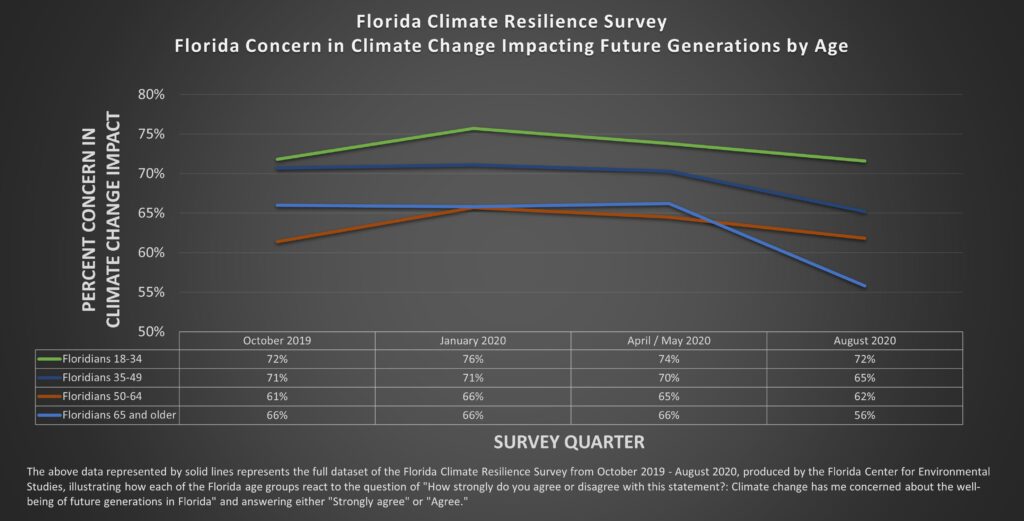The insights from August 2020 Florida Climate Resilience Survey are not presented in a stand-alone press release due to covid-related challenges, but are captured in our September 2021 press release.
Highlights
- About half of Floridians (55%) agree that Climate Change is mostly caused by human impact, comparable to 60% and 49% at the national level (for Yale and Pew, respectively). [National data taken from Yale Program on Climate Change Communication (YCOM), representing belief that Global Warming is largely caused by humans in the United States and the Pew Research Center (PRC) representing human contributions to Climate Change.]
- Overall belief in Climate Change in Florida has fluctuated over the past year, however for democrats and republicans, belief is still higher in August 2020 (93% and 84%) than it was previously (91% and 81% as of January 2020).
- Republicans (52%) are more likely to believe that the business community will lead future climate change adaptation efforts than Floridians as a whole (41%). This opinion peaked in January of 2020 (62% Republicans, 47% Florida overall), pre-pandemic, and has since declined in rates of agreement on the idea.
- When looking at the Floridian concern for future generations regarding Climate Change, overall concern for Floridians dropped to 64% (down from 69% in April 2020). This drop in concern was largely led by the oldest Floridians (ages 65 and up) who dropped to 56% (down from 66% in April 2020).
- Overall, Florida has shown a decline in believing Climate Change is a concern for future generations (Peaked in January 2020 at 70%, dropping to 64% in August 2020). This falls below the national level comparison, where concern that global warming will harm future generations was at 72% (in 2020 from Yale). [National data taken from YCOM.]
- Among political party affiliations, support for schools to teach Climate Change varies from party to party. Democrats have shown a gradual decline in support over the past year (peaked in October 2019 at 82%, dropping to 74% in August 2020), independents have experienced a drastic decline in support between April (65%) and August 2020 (51%), and Republicans peaked in January of 2020 (67%) and have since plateaued at about two-thirds (62% in August 2020) in support of teaching Climate Change in schools K-12.

Methodology
The survey was conducted in both English and Spanish from August 24, 2020 – September 3, 2020. The sample consisted of 1,000 Floridians, 18 years of age and older, with a margin of error of +/- 3.1 percent. The data was collected using an online panel provided by Dynata. Responses for the entire sample were weighted to adjust for age, race, income, education and region according to recent U.S. Bureau of the Census data. It is important to remember that subsets carry with them higher margins of error, as the sample size is reduced. For more information, survey results, and full cross-tabulations, visit www.ces.fau.edu/ces-bepi/ or contact Colin Polsky, Ph.D., at cpolsky@fau.edu.



